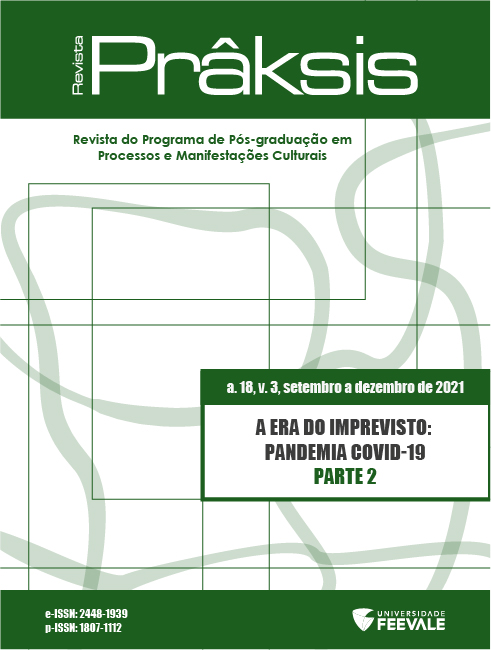EMERGENCY REMOTE EDUCATION IN PRIVATE HIGHER EDUCATION INSTITUTIONS
DILEMMS AND TEACHING CHALLENGES IN PANDEMIC TIMES
DOI:
https://doi.org/10.25112/rpr.v3.2646Keywords:
Remote education. Covid-19. Professors. University education.Abstract
At the end of 2019, the world was surprised by the Covid-19 pandemic, which expanded rapidly across the planet, prompting countless countries to adopt social isolation as a measure to try to contain the spread. In the educational area, this isolation has led to the interruption of face-to-face classes for millions of students, and the adoption of remote education as an emergency measure, to reduce the impacts on learning. Within this context, the present article, using a qualitative and quantitative method, sought to present an analysis of the challenges faced by professors at Higher Education Institutions - IES, based on data obtained in a research carried out with 23 teachers and higher education teachers from 3 private network institutions in the state of São Paulo. The data emerging from the responses of teachers and the respective analysis of results showed dilemmas and limitations of those surveyed in conducting their teaching work, after adopting the remote education modality. In relation to teachers, the following stood out: substantial increase in the non-contractual workload of teachers; lack of experience with remote education, the majority (65%) reported having no previous experience; almost all of the respondents say that the expenses with the acquisition of their equipment, as well as amounts spent on internet connectivity are covered by themselves. With regard to students: difficulties in accessing internet communication technologies in the monitoring of classes; and little student participation or interaction in classes.
References
BRASIL. Lei nº. 9.394, de 20 de dezembro de 1996. Estabelece as diretrizes e bases da educação nacional. Brasília, 20 de dez. de 1996. Disponível em: http://www.planalto.gov.br/ccivil_03/leis/l9394.htm. Acesso em: 02 out. 2019.
______. Decreto nº 9.057, DE 25 DE MAIO DE 2017. DIÁRIO OFICIAL DA UNIÃO Publicado em: 26/05/2017, edição: 100, seção 1, página 3.
______. Ministério da Educação. Portaria nº 343 de 17 de março de 2020. Diário Oficial da União, publicado em: 18 mar. 2020, edição: 53, seção 1, página 39.
______. Ministério da Educação. portaria nº 345, de 19 de março de 2020. Diário Oficial da União, publicado em: 19 mar. 2020, edição: 54-d, seção 1 – extra, página 1.
______. Ministério da Saúde. O que é COVID-19. 2020. Disponível em: https://coronavirus.saude.gov.br/sobre-a-doenca. Acesso em 10 out. 2020.
______. Ministério da Educação. Portaria nº 473, DE 12 de maio de 2020. DIÁRIO OFICIAL DA UNIÃO. Publicado em: 13/05/2020, edição 90, seção 1, pág. 55.
CHAUÍ, Marilena. O que é ideologia? 2. ed. São Paulo: Brasiliense, 2008.
FAN, Y.; ZHAO, K.; SHI. Z.-L.; ZHOU, P. Bat Coronaviruses in China. Revista Viruses, PMC, Biblioteca Nacional de Medicina dos EUA, v. 11, 2019. Disponível em: https://www.ncbi.nlm.nih.gov/pmc/articles/PMC6466186/. Acesso em: 16 abr. 2021.
GATES, B. The Next outbreak? We’re not ready. TED IDEAS WORTH SPREADING, abr 2015. Disponível em: https://www.ted.com/talks/bill_gates_the_next_outbreak_we_re_not_readyhttps://www.ted.com/talks/bill_gates_the_next_outbreak_we_re_not_ready?language=pt-br. Acesso em: 02 set. 2020.
IBGE. PNAD CONTÍNUA TIC 2018. Disponível em: https://www.ibge.gov.br/estatisticas/sociais/populacao/17270-pnad-continua.html?Edicao =27138&t=o-que-e. Acesso em: 12 dez. 2020.
KUENZER, Acacia Z. Da dualidade assumida à dualidade negada: o discurso da flexibilização justifica a inclusão excludente. Educação & Sociedade, Campinas, vol. 28, n. 100 - Especial, p. 1153-1178, out. 2007 1153 Disponível em: http://educacao.uniso.br/pseletivo/docs/KUENZER.pdf. Acesso em: 12 dez. 2020.
MARCONI, M. de A.; LAKATOS, E. M. Técnicas de pesquisa: planejamento e execução de pesquisas, amostragens e técnicas de pesquisas, elaboração, análise e interpretação de dados. 5. ed. São Paulo: Atlas, 2002.
MARINS, E. N.; SILVA, H. M. G. da. Um breve estudo sobre a educação a distância no Brasil e suas vicissitudes. Educ. a Distância, Batatais, v. 5, n. 2, p. 67-80, 2015. Disponível em: https://intranet.redeclaretiano.edu.br/download?caminho=/upload/cms/revista/sumarios/393.pdf&arquivo=sumario5.pdf. Acesso em: 23 fev. 2021.
MORIN, E. Desastres da pandemia. [Entrevista concedida ao] Jornal Le Monde. IHU Unisinos, 20 abr. 2020. Disponível em: http://www.ihu.unisinos.br/78-noticias/598378-esta-crise-nos-interroga-sobre-as-nossas-verdadeiras-necessidades-mascaradas-nas-alienacoes-do-cotidiano-entrevista-com-edgar-morin. Acesso em: 13 dez. 2020.
NAVAS, M. E. Coronavírus: a temida ‘doença x’ antecipada pela OMS há dois anos e ignorada pelo mundo. BBC NEWS. abr 2020. Disponível em: https://www.bbc.com/portuguese/geral-52383150. Acesso em: 02 mar. 2021.
PIMENTA, S. G.; ANASTASIOU, L. G. C. Docência no ensino superior. 2. ed. São Paulo: Cortez, 2005.
SARAIVA, Karla; TRAVERSINI, Clarice; LOCKMANN, Kamila. A educação em tempos de COVID-19: ensino remoto e exaustão docente. Práxis Educativa, Ponta Grossa, v. 15, e2016289, p. 1-24, 2020. Disponível em: https://revistas2.uepg.br/index.php/praxiseducativa. Acesso em: 22 abr. 2021.
SAVIANI, D. Sobre a natureza e especificidade da educação. 1984. Disponível em: http://ifibe.edu.br/arq/20150911214634120944442.pdf. Acesso em: 10 mar. 2021.
TARDIF, M.; LESSARD, C. O trabalho docente: Elementos para uma teoria da docência como profissão de interações humanas. 7. ed. Petrópolis: Ed. Vozes, 2012.
Downloads
Published
How to Cite
Issue
Section
License
Copyright (c) 2021 Welington de Andrade Matos, Maria Aparecida de Menezes

This work is licensed under a Creative Commons Attribution-NonCommercial-NoDerivatives 4.0 International License.
• Os autores mantêm os direitos autorais e concedem à revista o direito de primeira publicação com o trabalho licenciado sob a Licença Creative Commons - Attribution 4.0 International (CC BY 4.0).
• Os autores são estimulados a publicar e distribuir seu trabalho online (ex.: em repositórios institucionais ou na sua página pessoal), pois isso pode aumentar o impacto e a citação do trabalho publicado.


